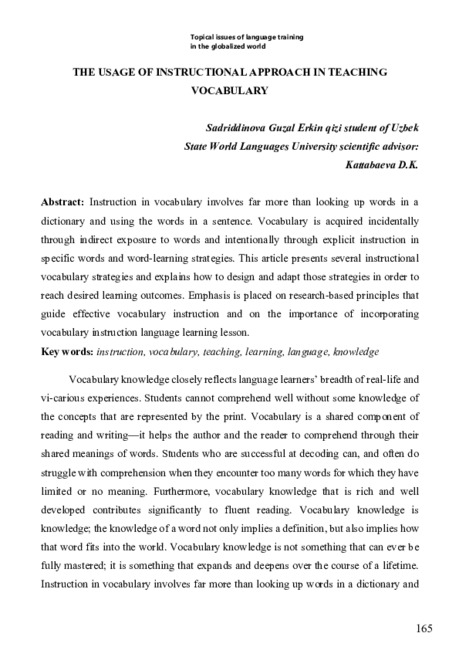
Topical issues of language training
in the globalized world
165
THE USAGE OF INSTRUCTIONAL APPROACH IN TEACHING
VOCABULARY
Sadriddinova Guzal Erkin qizi student of Uzbek
State World Languages University scientific advisor:
Kattabaeva D.K.
Abstract:
Instruction in vocabulary involves far more than looking up words in a
dictionary and using the words in a sentence. Vocabulary is acquired incidentally
through indirect exposure to words and intentionally through explicit instruction in
specific words and word-learning strategies. This article presents several instructional
vocabulary strategies and explains how to design and adapt those strategies in order to
reach desired learning outcomes. Emphasis is placed on research-based principles that
guide effective vocabulary instruction and on the importance of incorporating
vocabulary instruction language learning lesson.
Key words:
instruction, vocabulary, teaching, learning, language, knowledge
Vocabulary knowledge closely reflects language learners’ breadth of real-life and
vi-carious experiences. Students cannot comprehend well without some knowledge of
the concepts that are represented by the print. Vocabulary is a shared component of
reading and writing—it helps the author and the reader to comprehend through their
shared meanings of words. Students who are successful at decoding can, and often do
struggle with comprehension when they encounter too many words for which they have
limited or no meaning. Furthermore, vocabulary knowledge that is rich and well
developed contributes significantly to fluent reading. Vocabulary knowledge is
knowledge; the knowledge of a word not only implies a definition, but also implies how
that word fits into the world. Vocabulary knowledge is not something that can ever be
fully mastered; it is something that expands and deepens over the course of a lifetime.
Instruction in vocabulary involves far more than looking up words in a dictionary and

Topical issues of language training
in the globalized world
166
using the words in a sentence. Vocabulary is acquired incidentally through indirect
exposure to words and intentionally through explicit instruction in specific words and
word-learning strategies. According to Michael Graves, there are four components of an
effective vocabulary program:
>
wide or extensive independent reading to expand word knowledge
>
instruction in specific words to enhance comprehension of texts containing those
words
>
instruction in independent word-learning strategies, and
>
word consciousness and word-play activities to motivate and enhance learning
There is no single research-based method for teaching vocabulary. Intentional
vocabulary teaching
Specific Word Instruction
•
Selecting Words to Teach
•
Rich and Robust Instruction
Word-Learning Strategies
•
Dictionary Use
•
Morphemic Analysis
•
Cognate Awareness (ELL)
•
Contextual Analysis
Explicit instruction of vocabulary is highly effective. To develop vocabulary
intentionally, language learners should be explicitly taught both specific words and
word-learning strategies. To deepen language learners’ knowledge of word meanings,
specific word instruction should be robust. Seeing vocabulary in rich contexts provided
by authentic texts, rather than in isolated vocabulary drills, produces robust vocabulary
learning. Such instruction often does not begin with a definition, for the ability to give a
definition is often the result of knowing what the word means. Rich and robust
vocabulary instruction goes beyond definitional knowledge; it gets students actively
engaged in using and thinking about word meanings and in creating relationships among
words.
Word-learning strategies include dictionary use, morphemic analysis, and

Topical issues of language training
in the globalized world
167
contextual analysis. For ELLs whose language shares cognates with English, cognate
awareness is also an important strategy. Dictionary use teaches students about multiple
word meanings, as well as the importance of choosing the appropriate definition to fit
the particular context. Morphemic analysis is the process of deriving a word’s meaning
by analyzing its meaningful parts, or morphemes. Such word parts include root words,
prefixes, and suffixes. Contextual analysis involves inferring the meaning of an
unfamiliar word by scrutinizing the text surrounding it. Instruction in contextual analysis
generally involves teaching students to employ both generic and specific types of context
clues.
Fostering word consciousness
A more general way to help students develop vocabulary is by fostering word
consciousness, an awareness of and interest in words. Word consciousness is not an
isolated component of vocabulary instruction; it needs to be taken into account each and
every day. It can be developed at all times and in several ways: through encouraging
adept diction, through word play, and through research on word origins or histories.
It is often assumed that when students do not learn new vocabulary words, they
simply need to practice the words some more. Research has shown, however, that it is
often the case that students simply do not understand the instructional task involved.
Rather than focus only on the words themselves, teachers should be certain that students
fully understand the instructional tasks.
References
1.
Anderson, R. C., & Freediv, P. Vocabulary knowledge. In J. T. Guthrie (Ed).
Comprehension and teaching: Research reviews. Newark, DE: International
Reading Association. 2014
2.
Biemiller, A. Language and reading success. Cambridge, MA: Brookline Book.
2018
3.
Dalton, B. & Grisham, D.L. e-Voc strategies:10 ways to use technology to build
vocabulary. The Reading Teacher, 64, 306-317. 2016
4.
Юнусов, Анваржон Шухратович, and Мадина Хабибуллаевна Далиева.

Topical issues of language training
in the globalized world
168
"Паремиологическая картина мира и пословичные концепты." NovaInfo.
Ru 122 (2021): 72-73.
5.
Khabibullaevna, Dalieva Madina. "CONCEPT AS THE BASIS OF THE
LINGUISTIC PICTURE OF THE WORLD." British View 8.9 (2023).
6.
Madina, Dalieva. "CONCEPTUALIZATION OF TERMS-PRINCIPLES AND
METHODS." EPRA International Journal of Multidisciplinary Research
(IJMR) 9.10 (2023): 249-250.
7.
Dalieva, M. Kh. "ISSUES ON STUDYING CONCEPTUAL MEANING OF A
WORD IN A LITERARY TEXT." Thematic Journal of Applied Sciences 3.4
(2023).






